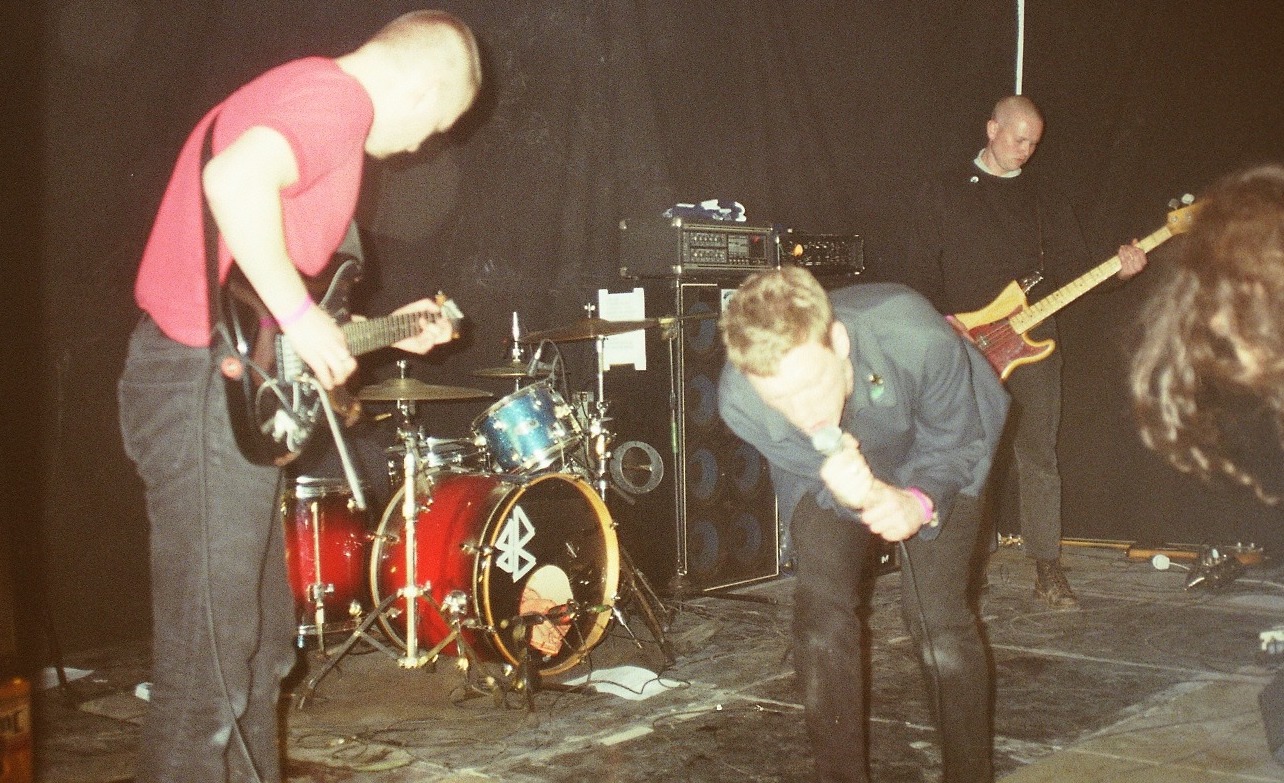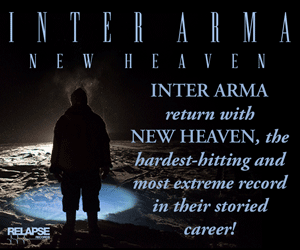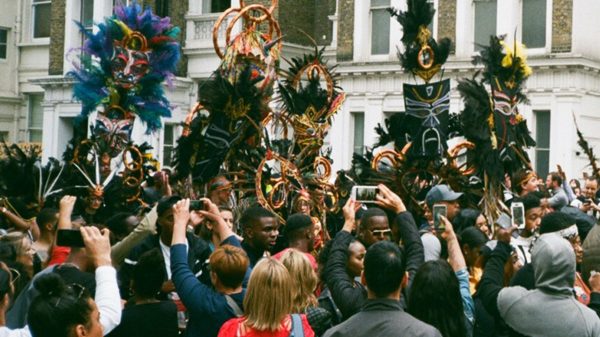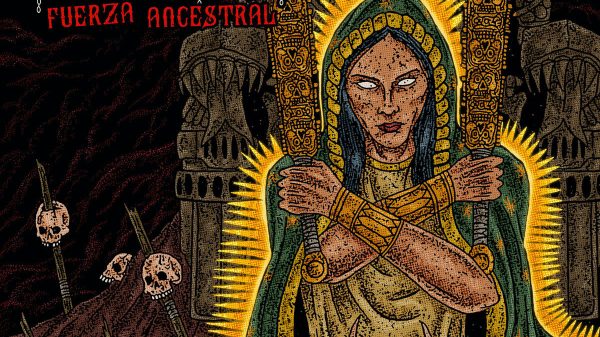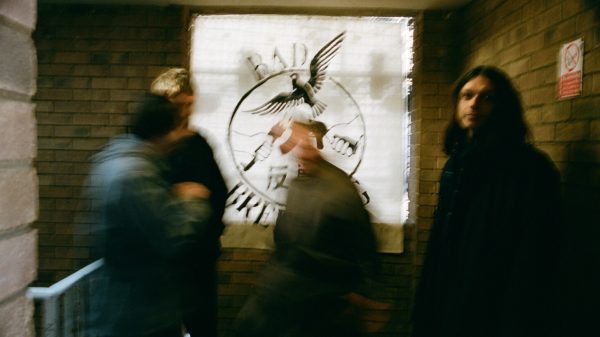From the 1st time I heard a song from the band BAD BREEDING, I was a fan. Now after reading their interview, I might be a stan. This band’s music and message speak not only to the 14-year-old Peace Punk me, they speak to who I am now and who I have always wanted to be. BAD BREEDING’s new album Human Capital is one of the most important records created in the past decade. I want to say thank you to the band for taking the time to answer our questions in such a thoughtful and honest way. I also want to thank Jensen over at Iron Lung Records for being a lifer at standing up for truth and rights. Big up for One Little Independent Records for doing what you do for decades. Below is our BAD BREEDING interview, which happens to be one of my favorite interviews of all time!
BAD BREEDING Labels: @onelittleindierecords | @ironlungrecords
Take us back to your childhood—what music did you hear around your home,
booming out of the cars in your hood, or at family cookouts?
My parents worked quite late during the week, so it was down to my brother and me to occupy ourselves until they got home. If we weren’t out playing football down the shops or whatever it was pretty much arguing over music channels: MTV Base, Channel U, and a bit of MTV2 as well. On Saturdays, my dad took us to football, so a lot of those journeys were soundtracked by pub rock and punk compilations — Sham 69, Peter and the Test Tube Babies, The Stranglers, Angelic Upstarts, and a lot of Stiff Little Fingers. Mum was a massive Roxy Music fan back in those days. Endless For Your Pleasure and Stranded when she was home. My old man gave me his record collection when I was 18 or so, and it’s through that where I fell into all of the Crass Records, Spiderleg, and Clay stuff. I came to all that after digging through everything he gave me. It was a bit of a gateway into that world and also into the short-lived period when Stevenage played host to a lot of those bands passing through in the ’80s at Bowes Lyon House.
D & V (Inspiration Gave Them The Motivation To Move On Out Of Their Isolation) CRASS Records
Flux of Pink Indians – “Taking a liberty” Spiderleg Records
Discharge – State violence state control / Doom’s day 7″ Clay Records
What two historic events or political movements have made an impact on
your band?
For me personally, the standout one would have been the Whitehall demos in opposition to spending cuts to further education and an increase of the cap on tuition fees by the Tory-Lib Dem coalition government in 2010. Those demos were my first real physical foray into a political movement, other than my early teenage interest in the invasion of Iraq in 2003. Obviously, there are so many historical moments and movements that have built revolutionary class consciousness in the UK — John Ball and the Peasants Revolt, The Chartists, and Sylvia Pankhurst’s Workers’ Socialist Federation, right through to the International Brigades, Orgreave, and the increasing number of community-led movements we see nationwide today.
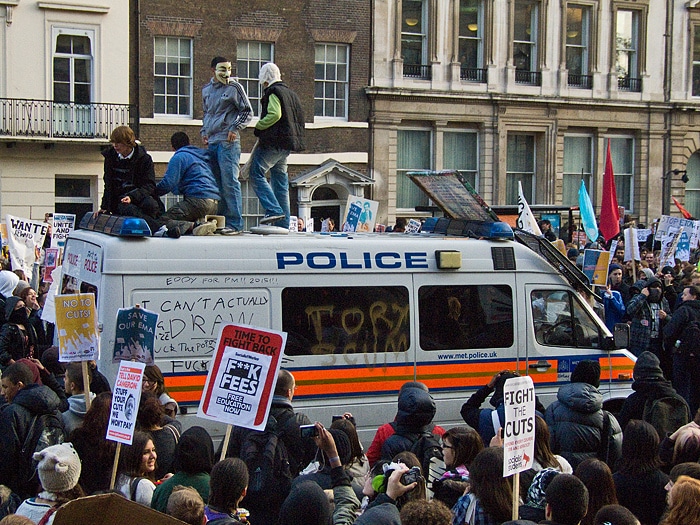
Student protests in London
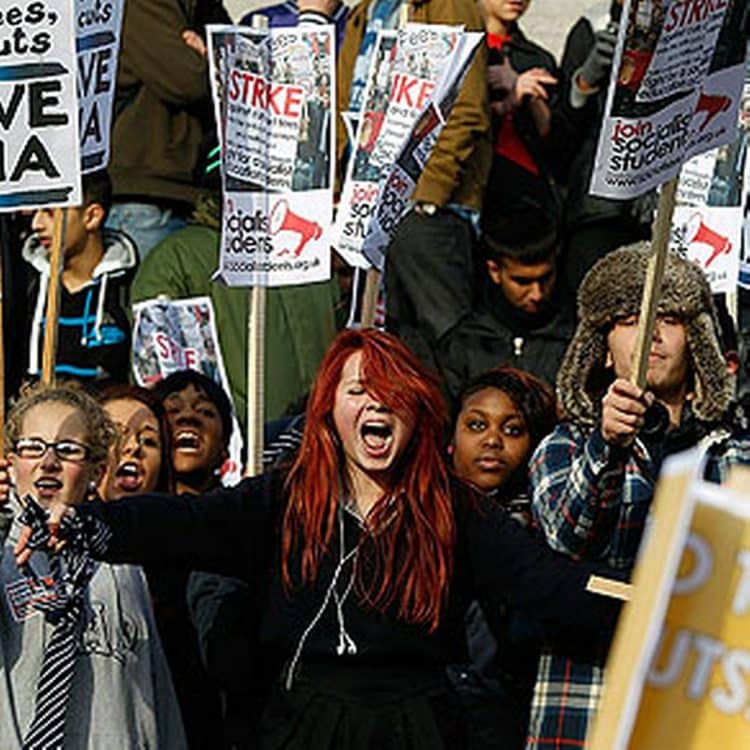
Give us the science behind the title and artwork of your new album, Human
Capital?
We’ve worked with Nicky since the start of doing the band. Often we talk through the album’s concept and share the lyrics then we pass it over to him for his own interpretations. The overachieving theme of the cover is that whole cyclical process: birth, constant struggle, and all the tumult and anxiety in between, followed by death. Obviously that’s a simplification of what Nicky was trying to achieve, but it’s an artwork that tries to speak to that seemingly inescapable repetition of pressure and ritual despondency we’re forced to contend with.
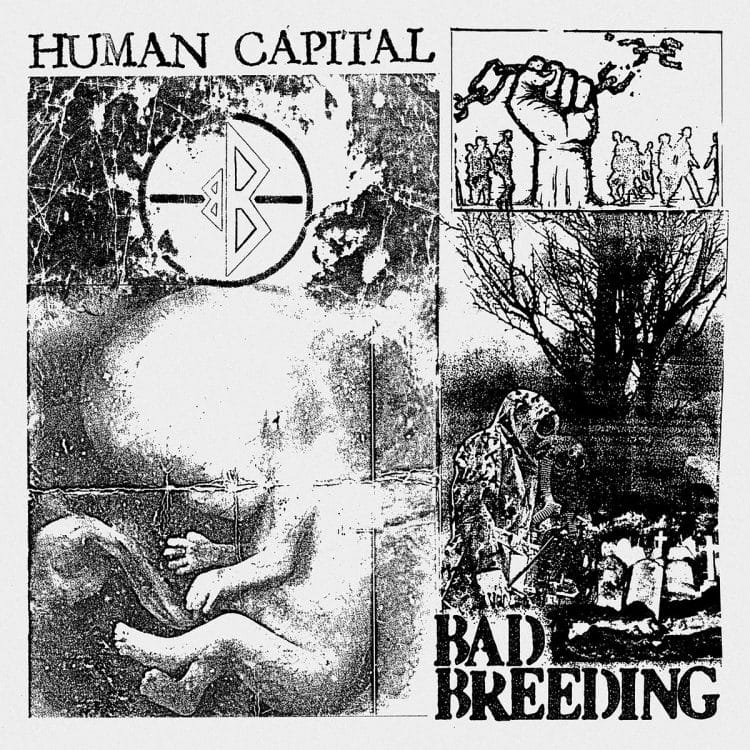
Describe three of your songs in terms of your favourite foods, and tell us how
these songs will feed our souls and minds?
Probably the whole album in the shape of a Sunday roast. Has all the shit you need ready to get back to the slog on Monday. Knackers you out, but it’s worth it. Eaten at your Nan’s house or in a pub with a pint. Plethora of options for vegetarians and vegans. It’s a dinner that speaks to the masses and something we can all get behind in some way or another. Unless you’re utterly miserable.
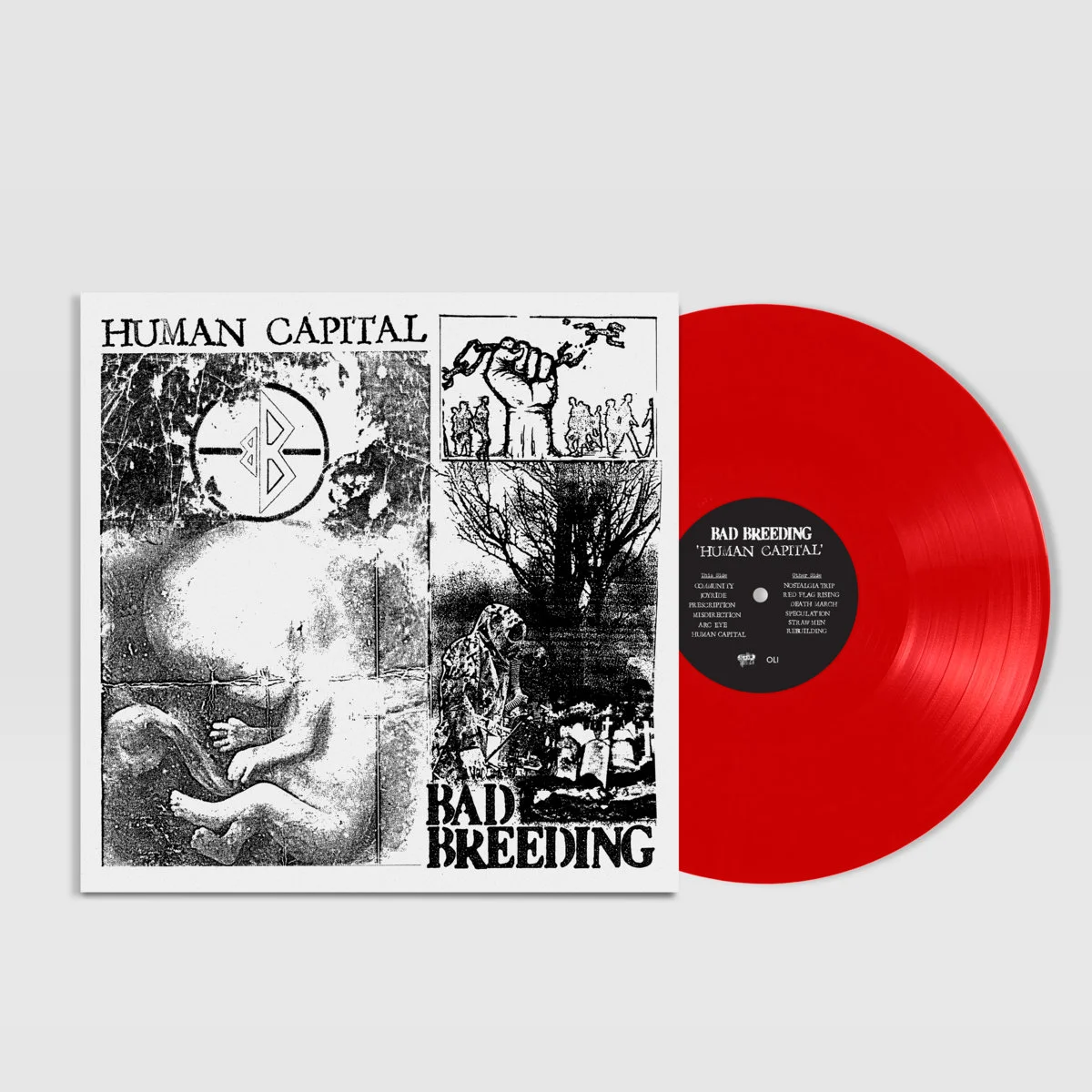
What role do your Anarcho-Peace Punk ancestors play in the way you see the
world, and how do they impact the way you create?
There’s some slight crossover in the political nature of what we’re discussing, but the leanings on this band aren’t strictly anarchist in material terms. I’d say the most influential thing about that whole period was its confidence in experimentation and its desire to foster community — to organise and provide resistance in a way that the music was just one part of a wider vehicle. Crass Records, Spiderleg, and a lot of those labels of the period provide a document of how you can educate and organize not only with songwriting but also with artwork, essay writing, and putting
on and participating in shows.

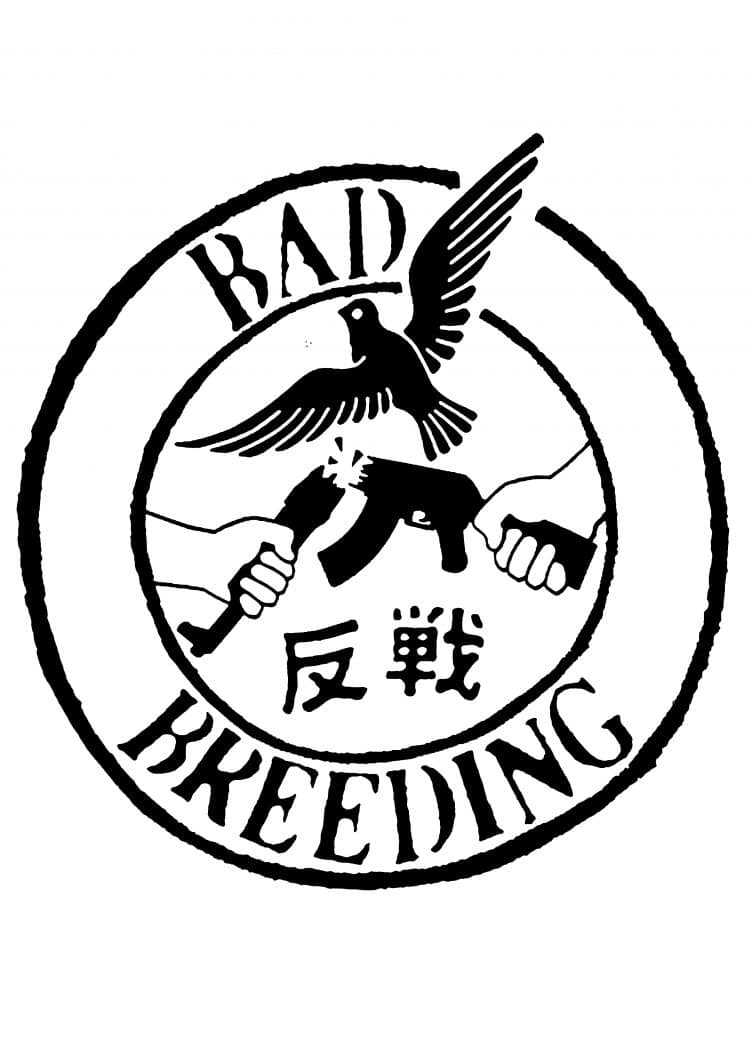
What four albums have had a major impact on y’all’s creative spirit? Each of
you pick one.
Chris: Strive to Survive Causing the Least Suffering Possible, Flux of Pink Indians. Visceral but listenable with really catchy songwriting. It’s never overly verbose and catches you right where it needs to. Whenever you go back to this record it still feels invigorating. Much like a lot of anarcho records from that period, it left its mark on me not only with the messaging but also the avenues they explored to push those ideas — the artwork, pamphleting, and essay writing.
Feeding of the 5000 by Crass is obviously up there as well. Conflict’s Increase the Pressure and The Ungovernable Force too. Can’t leave out Rudimentary Peni’s Death Church either.
Not related really, but also This Heat’s Deceit, unrivaled experimentation and structural ambition on that record.
Flux of Pink Indians: Strive to Survive Causing the Least Suffering Possible
Charlie: Too Many Humans, No Trend — Hilarious, terrifying, and righteous in equal measure. The band’s rejection of conformity to scenes is something that always intrigued me. That whole notion of not trying to fit in with cliques for social capital always resonated. This record feels like a band holding the mirror up to its audience in utter disgust.
No Trend ~ Too Many Humans
Ashlea: Not sure in terms of creative spirit but if we’re talking about records we love then anything that has James Gadson playing drums on. All the Bill Withers stuff he’s on. Makes everything feel so effortless and ridiculously soulful. All those chops while barely moving his hands. Poetry.
Couldn’t get hold of our guitarist because his phone was off, but know that he loves talkSPORT radio phone-ins and Gang of Four’s Entertainment.
Gang of Four Entertainment
If three of your songs from Human Capital were placed in a time capsule to be
opened 60 years from now, what songs would you put in there, and why?
Life on earth in 60 years’ time? That’s ambitious. I’m skeptical at the moment. Erm… Joyride, Human Capital, and Rebuilding. Maybe Rebuilding as one of those “what might have been” moments. If people are still walking scorched landscapes half a century from now, then Joyride would hopefully serve as a reminder of the mighty Stevenage and all that latent power that had existed in working towns.
Describe Human Capital as a weapon of mass change—what impact do you
want to see it have on culture?
Something that contributes to discourse — whether that be opinions or something that serves as an entry point for people. There’s promise and hope in parts, but it’s also fraught with contradiction at points and I think that’s a measure of where a lot of people find themselves in the midst of a decaying economic system that lurches from crisis to crisis as an integral part of its underlying function.
Talk to us about the bond of friendship that runs through BAD BREEDING, and how that translates into the way y’all create together?
We’ve known each other since we were kids, either from school or football or whatever, so it’s a fairly familial thing. You get everything that obviously comes with that: love, hatred, arguing, compromise, and hopefully something that was worth fighting for when all is said and done.
I wanted to get your take on defunding or abolishing the police. How do you think it could benefit communities in the UK?
Obviously policing in its current form serves and protects the interests of capital and the ruling class. It’s one of the central instruments of state power and is the obvious tool of class oppression. For fundamental change, it’s integral to limit state control as much as possible while attempting to alter our political economy and free people from the constraints of class society entirely. That has to be the long-term ambition. If there are no class antagonisms there is no reason for such an organization of blunt force and repression to exist.
When y’all think about how British imperialism/colonialism impacted POC around the world, do y’all channel this rage into your music?
There are a few songs on the new record that look at the impact of imperialism — inherently the highest stage of capitalism and one of its most destructive tenets. Watching the nonstop cycle of 24-hour news media of the last two decades you get sold into this idea of Good vs. Evil through sock puppets — vessels for multinational interests — who will moralize and quietly warmonger with a deft sleight of hand, counting the dead with a twinkle in their eye. That’s the angle of some of the songs on this record. Looking beyond the constructed morality. Contending with that wild duality in the liberal West, which on the one hand will beam you distressed images of malnourished and maimed children choking for breath while building and selling the very arms that obliterate school buses and destroy hospitals.
If you could develop your own curriculum for the British School System that
focused on inclusivity, what kind of classes would y’all teach and why?
Less Tudor bollocks and the nostalgia of British imperialism, more Brixton ’81, Stonewall, and the Miners’ Strikes. Taxing the rich properly, abolishing private schooling, and redistributing the wealth to the state sector would be a decent short-term response. Cull the nonsense that the logic of the market provides better standards for everyone. It doesn’t. It breeds inequality, disparity, and nepotism. Bury the Good Ol’ Boys and Girls networks and bring an end to the social and cultural capital gained from private education. Of course, we’re talking here about changes that would upend the dominance of bourgeois concerns which are at the heart of a lot of educational institutions — neutering class consciousness and casting history in a revisionist context.
Aside from the politics, more of a focus from a younger age on navigating the immediate challenges of poor nutrition and access to good food and produce. Last time I checked, I know there was a Food and Nutrition course offered at GCSE level in the UK, but this stuff should be fundamental in young people’s lives from an early age. A lot of schooling in the UK only seems to atomize rather than educate.
Why do you feel that some working-class whites are at odds with POC and
immigrants when the rich (“upper class”) are fucking all of them over?
I think looking at endless years of misdirection and manipulation as a means of division is one of the fundamental reasons why this might be the case in some places. Poverty, degradation, and woeful economic conditions are ripe for exploitation and populist tendencies. But it’s also true that a lot of communities are bonded together by their material economic conditions and seek solidarity in their commonality of position. What I would say is that the whole white working class narrative is central to fostering division. It divides a group of people who have the< potential to challenge power and be a force for change when united in the fight against economic and social inequality.
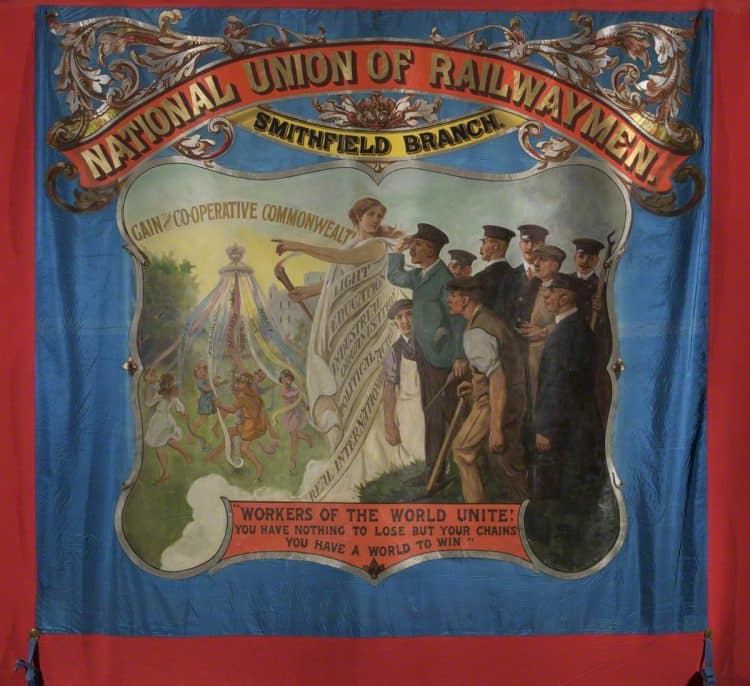
There are so many moments in history that have conveyed the sort of power held in the unity of working people. Jim Prendergast, who fought during the Spanish Civil War and went on to head up the National Union of Railwaymen, worked tirelessly to break the colour bar and end racial segregation in employment of London Underground rail stations. Sean Horsey and postal worker Steve Marsling flew to South Africa with concealed explosives and ANC leaflets in fiberglass-bottomed suitcases to play their part in the struggle to end apartheid. Six months after Pinochet’s bloody coup in Chile in September ‘73, four working-class Scotsmen downed tools and refused to service and repair engines for the Chilean air force’s Hawker Hunter planes that helped to save prisoners’ lives.
For all of the racist and fascistic tentacles that have burrowed their way into communities across the world, there is still hope and enormous power in a unified working class. Division seems to be the central element at play.
Why did y’all start the album with “Community” and end the album with
“Rebuilding”?
Conceptual and musical considerations I think. Given the lyrical content and what emotional reactions we were trying to drag out, we wanted to drop people straight into it as opposed to building into something. Hence the pronounced pace changes at the start of Community. Thematically the first song on the record tries to paint what is possible in the idea of solidarity but it also foreshadows the challenges that act as an impediment and are explored on the rest of the LP too. With Rebuilding, we wanted to use the final song to posit some ideas about pathways forward. Also, you can’t really have a song with a lap-steel and organ anywhere else other than the end.
Talk to us about these two songs “Misdirection” & “Red Flag Rising” — what was the creative process like and what emotions provoked you to create these songs?
Lyrically, Misdirection was written about the hardened Conservative mindsets you sometimes come across in towns like Stevenage. It’s a song about the decades-long war of manipulation and ideology played out in communities by both politicians and capital projects. In 2021, data from The House of Commons Library showed that the child poverty rate in Stevenage had increased 22 percent since 2014/2015, something that has likely been exacerbated throughout Covid and will likely get worse during a punitively punishing cost of living crisis. We sit on the border of one of the largest economic centers of the world, but privatized train networks see you fork out over 25 quid for a 20-minute train journey to get there for work. Foodbank reliance from people doing 40-plus hour weeks is rapidly increasing. Private investment and enterprise booms, while commitment to social projects dwindle. Yet we still see the town led by a Conservative MP.
It’s a contradiction you see in so many places, too. Likely because of the encouragement of rampant individualism and skewed worshipping of a supposed meritocracy since Thatcher, but also because of the so-called left in electoral politics abandoning the material concerns of working people. Only for a very brief spell around 2017 did we see a contemporary Labour party that was even vaguely representative of workers.
What I said about contradictions on the record earlier, in the face of all of that you still see growing pockets of resistance in the town and there are some incredible people doing fantastic organizing work in the face of degradation by building solidarity and community. That’s where I was at lyrically with Red Flag Rising. If we witnessed anything of real human value during the pandemic, it was the latent power that flourished in working communities — from the monumental efforts of pitifully paid NHS staff to the thousands of mutual aid initiatives established in solidarity by local people in different parts of the world. While the governments and financial systems they found themselves in the pockets of were both incapable and unwilling to respond to people’s needs, it was in worker-led, community movements where fellow neighbors provided support. Red Flag Rising celebrates that strength shown in communities that have been perennially vilified and whose very existence has been tempered by economic and social division waged by proponents of neoliberalism. The song takes its title in reference to the mounting strength of the ACORN renters union, which has been building significant community resistance to parasitic landlords and providing renters with a platform to fight for security of tenure.
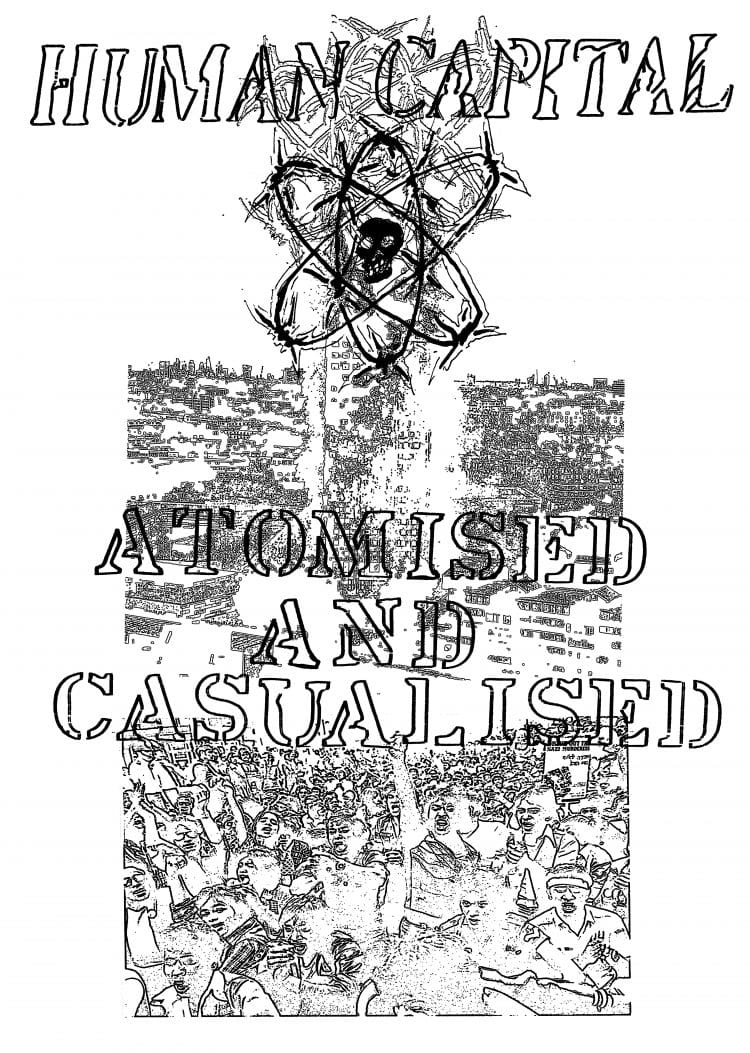
Top 5 MC’s Dead or Alive?
Rakim. Tupac Shakur. KRS-One. James Joyce. Adrienne Rich.
Eric B. & Rakim – Paid In Full
Tupac Shakur
KRS-One
James Joyce
Adrienne Rich
Any DIY or underground Businesses in the UK y’all would like to big up?
La Vida Es Un Mus, Static Shock, Quality Control, Drunken Sailor, all the 0161
Community groups in Manchester, London, and Glasgow, Stevenage Community
Foodbank, People4People Stevenage, The Aleph Press, Favourite Chicken in Old
Town, Masoom Tandoori, and everyone organizing for better conditions in the face
of a perennially dog shit economic system.

